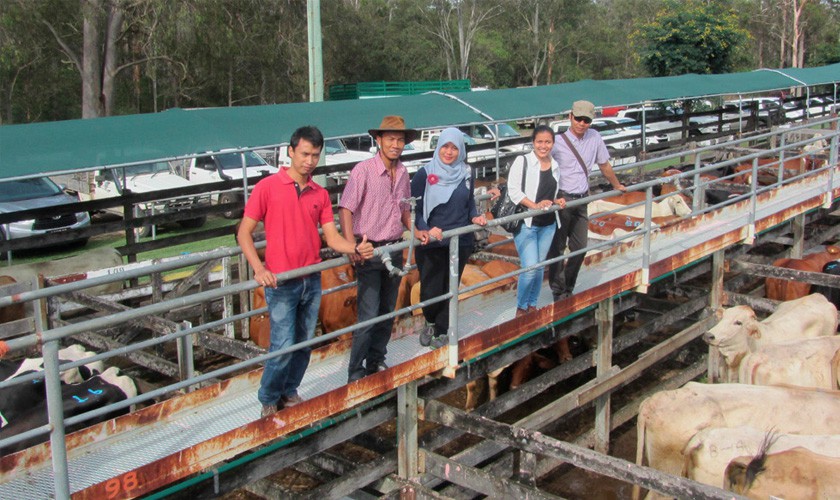Small changes create high hopes
Having participated in the Partnership’s Skills Development Programme, Indonesian meat processors are learning that simple operational changes can have a big impact on attitudes.
Pak Aswar is a veterinarian who oversees animal welfare at Cibinong abattoir in West Java, Indonesia. In 2015, he travelled to Australia to take part in the Partnership’s Meat Production, Processing and Supply Chain Management short course.
Conducted by TAFE Queensland South West, the six-week course is designed for staff working in Indonesian abattoirs that have the desire and potential to reach global export standards. Participants develop skills in animal welfare, food safety, hygiene and commercial production standards.
The first week of the course is theoretical learning and instruction in the TAFE classroom, with the remaining five weeks spent training at Nolan Meats, a world-class beef processing facility in Gympie near Brisbane. Coming from a government-operated abattoir that processes only 20 to 40 head of cattle each day, Pak Aswar was amazed by the modern equipment used at Nolan Meats, where over 500 head are processed every day.
While he acknowledges that it is unrealistic for operations in his abattoir to be fully automated, Pak Aswar is not discouraged about making improvements to current practices.
“We focus on producing better quality halal meat using the resources we have,” he says.
On his return from the short course, Pak Aswar shared his learnings with his colleagues and the abattoir’s management team, particularly on the need for improving hygiene and sanitation.
Measures implemented by management on Pak Aswar’s recommendation include using an existing water heater to sterilise knives and the introduction of knee-operated water taps to minimise hand contact. The abattoir has also recently received government funding to improve its railing system and gangway.
The improved conditions at Cibinong abattoir have not gone unnoticed. In October 2016, the facility won the national award as the best government abattoir in Indonesia.
“This award not only acknowledged the improvement of our physical facilities, but also good implementation of standard operating procedures,” says Pak Ade Kusmawati, manager of Cibinong abattoir
FOLLOWING THROUGH ON OPERATING PROCEDURES
The development and implementation of standard operating procedures (SOPs) in Indonesian abattoirs has been a particular focus of Partnership course coordinators at TAFE Queensland South West. The coordinators have initiated a special project that sees Australian experts working with owners and managers of select Indonesian abattoirs, to develop SOPs that aim for global best practice in meat processing.
The SOPs, which are tailored to the needs and capacities of each individual abattoir, include a focus on processes that are hygienic, humane and efficient. Only those Indonesian abattoirs that commit to the SOP project are entitled to send employees to the Meat Production, Processing and Supply Chain Management short course in Australia.
One such abattoir is PT Cianjur Arta Makmur, which sent two members of its production team, Pak Sumanta and Pak Agung Bakti, to join the course in early 2016.
Both men were impressed by the course, particularly with the hands-on training at Nolan Meats, where they were taken through all the fundamental skills used for meat processing in Australia. These skills included pre-mortem and post-mortem beast inspection, boning and deboning.
Another highlight for the Indonesian visitors was the chance to observe the work ethic and discipline of the processing workers at Nolan Meats, and this impacted on the development of the SOPs for PT Cianjur Arta Makmur.
“I believe that we also have sufficient technical skills, however we have been lacking the discipline in following procedures,” Pak Sumanta says. Using their experiences gained during the course, Pak Sumanta and Pak Agung began identifying areas for improvement at PT Cianjur Arta Makmur. Their immediate focus was on improving the hygiene and sanitation of the facility. They modified hand-operated taps into knee-operated ones, created a basic sprinkler system to shower cattle prior to slaughter, improved the lighting in the plant to enhance visual checking of carcasses, and strengthened the double railing systems in the facility.
In total, there were 11 upgrades to equipment in the abattoir to improve hygiene and sanitation. Pak Sumanta and Pak Agung believe that these changes have improved the shelf life of the meat processed at PT Cianjur Arta Makmur.
“We were all impressed by what we saw at Nolans, but it would be too expensive if we buy the same equipment that Nolans have,” Pak Agung says. “Hence, we asked a local workshop to build similar equipment for us at a fraction of the price.”
The SOP project includes Australian experts making follow-up visits to Indonesian abattoirs, to observe whether or not any additional training or assistance is required to modify the plant or its work practices. During the follow-up visit to PT Cianjur Arta Makmur, the Australian project coordinators expressed great satisfaction with the improvements made in the abattoir.
“I was really impressed with how far they have come,” says Mr Glen Eckhardt, Leading Vocational Teacher (Meat Processing) at TAFE Queensland South West. The abattoir’s management is now working on rolling out in-house training on the new SOPs to all workers. This training will be delivered by the abattoir’s quality assurance team, members of which have also participated in the processing short course in Australia. The team has developed a basic video to show meat production trainees how to properly perform each process.
Pak Sumanta and Pak Agung are confident that these incremental changes can make a lasting impact on their business.
For more information on the Skills Development Programme, visit agriculture.gov.au/partnership









